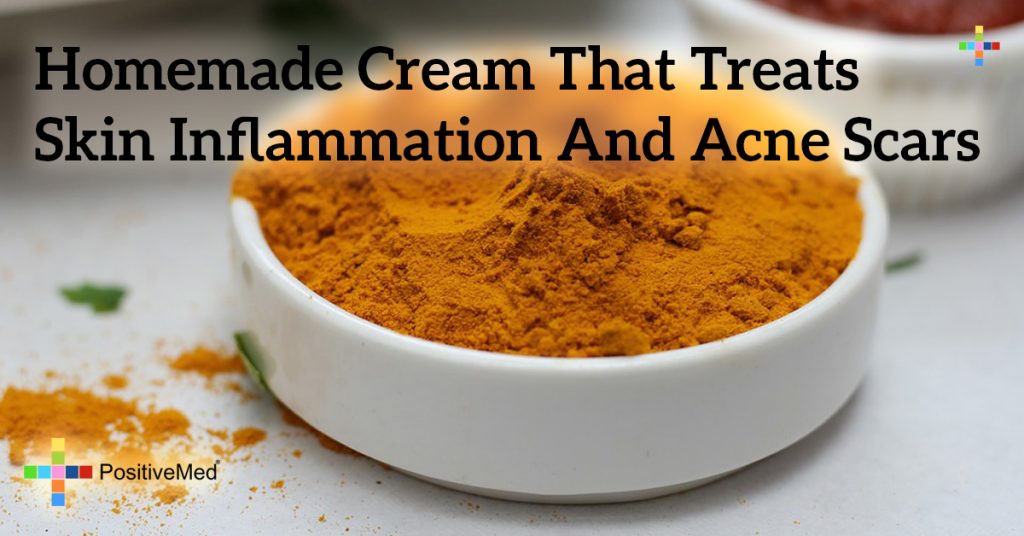
[nextpage title=”…”]
Turmeric, a member of the ginger family, is widely known for having many health benefits. It has been used for thousands of years in Chinese medicine to heal skin wounds, help stomach issues, and improve blood circulation. One of the most important active compounds in turmeric, curcumin, also has health benefits such as anti-inflammatory, anti-bacterial, anti-oxidant, anti-viral and anti-fungal. One of the most noticeable positive effects that curcumin has on this body is its ability to heal the skin.

A new study has shown that turmeric is able to heal skin wounds faster than they can heal on their own. Turmeric can also reduce the chances of having a noticeable scar following surgeries or injuries.
For oily skin, which can lead to breakouts, turmeric can reduce the production of sebum which will, in turn, reduce acne. If turmeric cream is used twice a day, it can help facial skin be clear due to its components of fatty acids and phytosterols, which reduce skin oils.
Too much exposure to the skin over time will result in skin damage, such as wrinkled and saggy skin and possibly skin cancer. Turmeric, however, has shown to help protect the skin from UVB rays, if applied twice a day. This is because the radiation of the sun activates an enzyme that degrades collagen, but with the use of turmeric, this enzyme is blocked, which helps to keep the collagen active in the skin.
Turmeric can also aid in the aging process. The aging process has a lot of variables, including genes, lifestyle, and metabolism. Aging begins to show a decline in how efficient one’s body is working. Due to the anti-inflammatory components and anti-oxidant properties, turmeric can help to reduce the signs of aging and benefit the skin. Clinical trials have shown the positive effects of turmeric on the aging process.
RELATED ARTICLE: A TRUE ANTI-AGING MIRACLE THAT WILL MAKE YOU LOOK 10 YEARS YOUNGER!
[/nextpage] [nextpage title=”…”]
Curcumin has anti-cancer properties that are able to kill cancerous cells while leaving healthy cells as they are. This is different from chemotherapy, which kills all cells, cancerous or healthy. Curcumin can also prevent pre-cancerous cells from becoming malignant. There has been a lot of potential shown in studies of curcumin in the fight against skin cancer.
Eczema, rosacea, scleroderma, and psoriasis have all been treated with curcumin, due to its anti-inflammatory effects. When curcumin stops pro-inflammatory molecules from forming in the body, it prevents these diseases from hitting the surface and causing a reaction in humans. This can also help auto-immune diseases as well. With its diminishment of free radicals, curcumin is a powerhouse of benefit to the body.
There are a couple of ways to incorporate curcumin and turmeric into your body. Firstly, oral capsules can be taken. Oral supplements are able to create a potent amount of curcumin while leaving some unnecessary components behind. For this to be best absorbed, curcumin tablets should be taken with black pepper extract.
Turmeric is a spice that can also be added to flavor many foods. While it is harder to get a lot of curcumin into your diet this way, it is one way to start without having to take a supplement. Add turmeric to chicken or fish dishes on a regular basis to boost your intake.
Anti-Inflammatory Turmeric Cream
To apply topically, create a turmeric mask to leave on the skin for thirty minutes before washing off. This includes one teaspoon of turmeric powder, one teaspoon of plain yogurt, and one teaspoon of honey. After allowing this mask to harden, gently remove it to show a more beautiful and younger looking skin. Turmeric powder can also be added to face creams and creamy face washes to get the maximum benefit.
[/nextpage]





